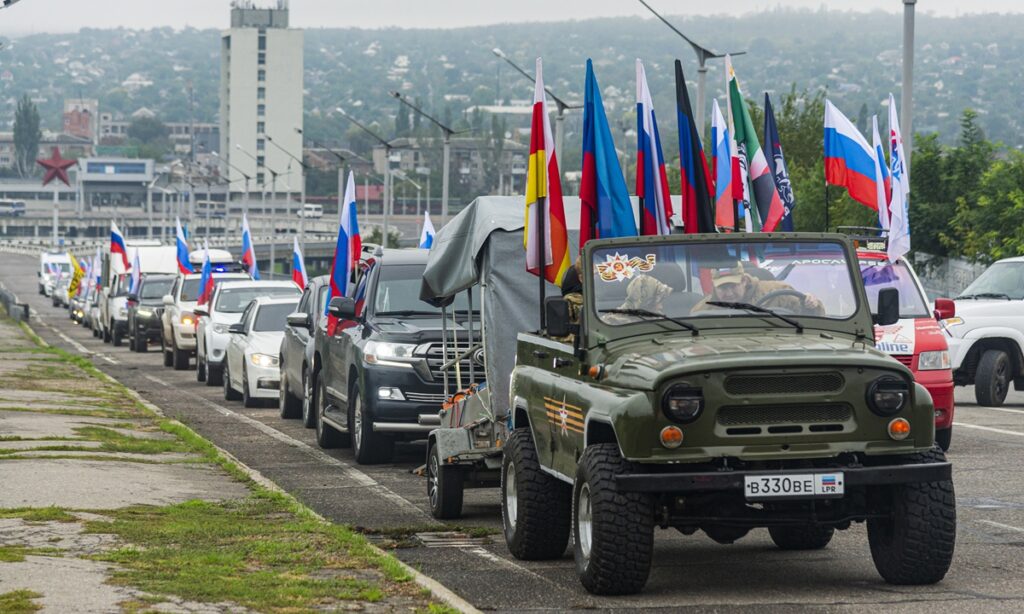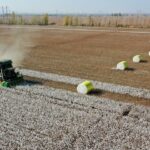Referenda on “joining Russia” in four Ukrainian regions – Lugansk, Donetsk, Zaporozhye and Kherson – are scheduled to conclude on Tuesday, as Chinese analysts said this may make Russia consolidate what it has gained from the conflict since February, bringing new pressure to the West on how to assist Ukraine and making peace negotiations more difficult.
The US and Western countries who support Kiev will face new pressure, because after Russia’s partial mobilization, it would be very difficult for Ukraine to regain control in these regions. This means Ukraine will ask for more direct support from the West to help it retake its lost territories, so the risk of direct conflict between Russia and NATO is rising, and the West needs to make a tough decision for this new situation amid the serious energy crisis, experts said.
The majority of the international community may not recognize the referenda, in the same way they do not recognize Russia’s control over Crimea since 2014, but it won’t change the reality, said analysts, noting that the four referenda this time will be different from Crimea’s case, because the conflict is still far from ending, so most members of international community will continue to observe the situation and cautiously decide their next move.
Chinese Foreign Ministry spokesperson Wang Wenbin said on Tuesday that “China has always upheld the sovereignty and territorial integrity of all countries should be respected; the purposes and principles of the UN Charter should be abided by, the legitimate security concerns of all countries should be taken seriously.”
All efforts to resolve the crisis peacefully should be supported, Wang said, noting that “On the Ukraine issue, China has always stood on the side of peace and has been committed to promoting talks. We will join the international community to keep contributing constructive efforts to promoting the easing of the situation.”
Ukraine is being tough on the matter regarding the country’s sovereignty and territorial integrity, as Mikhailo Podolyak, Ukraine’s presidential adviser, said Ukrainians who help “Russian-backed referenda” will face treason charges and at least five years in jail, Reuters reported on Tuesday.
Moscow is also expressing its determination to warn Kiev and the West. Dmitry Medvedev, deputy chairman of Russia’s Security Council, said Russia had the right to defend itself with nuclear weapons if it is pushed beyond its limits and that this is “certainly not a bluff.” Russian President Vladimir Putin last week ordered Russia’s first partial mobilization since World War II, warning the West he was not bluffing when he said he would be ready to use nuclear weapons to defend Russia.
Song Zhongping, a Chinese military expert and TV commentator, told the Global Times on Tuesday that “current Western support, including weapon supplies and offering intelligence sharing and military advisors, to Ukraine is not enough for Kiev to take the four regions back, and via the referenda, Russia is trying to secure what it has already gained from the seven-month conflict.”
In the regions like Donetsk, Zaporozhye and Kherson, some territories are still under the control of Ukrainian forces, so since Russia regards these regions as its own, Russian troops will continue their offensive in these regions until they completely occupy them, Song said, noting that “this means the conflict will definitely continue.”
Russia is setting a new starting point for the next stage of its operation, and Moscow fully understands that it cannot lose the fight, so the West needs to consider whether to become more directly involved or not, Song noted.
Cui Heng, an assistant research fellow from the Center for Russian Studies at East China Normal University, said that the referenda will lead to further escalation of the ongoing conflict as this will shrink the possibility of diplomatic negotiations between Russia and Ukraine.
Ukrainian President Zelensky said in a CBS interview on Sunday that “if Russia successfully annexes occupied territories of Ukraine,” it would spell the end of diplomatic negotiations between Russia and Ukraine.
The referenda will also make the West continuously expand military assistance to Ukraine, but since the US and the EU do not want to escalate the confrontation into a nuclear war with Russia, direct military intervention from NATO is unlikely, analysts said.
Cui Hongjian, director of the Department of European Studies at the China Institute of International Studies, said “As the US mid-term elections are near and the EU energy problem gets worse with the upcoming winter, it is less likely that the West will have a direct confrontation with Russia on the battlefield, and the Russian side knows that clearly.”
(Global Times)




